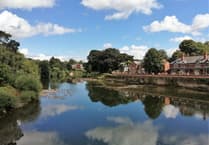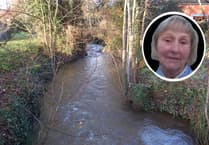CRITICAL evidence has been submitted to the Cunliffe Enquiry—the Independent Commission on the Water Sector Regulatory System—highlighting the alarming decline of the River Wye and its tributaries.
The submission, made by the Environmental Law Foundation, in collaboration with Lord David Lipsey as the chairman of an ad hoc group of parliamentarians at Westminster who represent seats local to the Wye including, Ellie Chowns MP and Lord Lisvane, focused on the River Wye, raising grave concerns about the worsening ecological state of this iconic river.
The River Wye was once celebrated as the birthplace of British tourism and now Lord Lipsey and the cross-party group of parliamentarians representing communities along the Wye are united in their alarm at the river’s environmental deterioration.
The evidence submitted demonstrates that the Wye is not only threatened by sewage pollution, but also by intensive industrial chicken farming. With over 20 million chickens in the catchment area, it is estimated that up to 90 per cent of the phosphorus load from chicken manure is leaching into the river, compounding the devastating impacts of 70,000 hours of raw sewage spills recorded in 2023 alone.
This combination has led to the downgrading of the Wye's protected status.
Emma Montlake, joint executive director at Environmental Law Foundation, said: “We work with many grassroots communities significantly impacted by sewage pollution. Through our submission, we have given them a voice.
“However, it is deeply concerning that the enquiry’s remit focuses solely on sewage pollution. Agricultural runoff, road-related diffuse pollution, pharmaceuticals, and 'forever chemicals' are fundamentally altering our water systems and harming the species that depend on them."
The submission also highlighted the foundation’s broader work supporting communities across England facing water pollution crises, not only endangering native species but also posing significant public health risks.
Notably, the Environmental Law Foundation criticised the enquiry’s narrow scope, emphasizing the urgent need for a holistic regulatory approach that accounts for all pollution sources including agriculture.
They called for the establishment of local water governance bodies with representation of affected local communities, empowered to monitor, protect, and make decisions about specific waterbodies—before catastrophic environmental damage occurs.
They also called for planning reforms to allow consideration the true environmental cost of industrial agri-supply operations, including the concentration of mass-reared livestock within a single region and the proximity of these industrial-scale operations to conservation areas.
Lord Lipsey added: “As a regular swimmer in the Wye I am shocked by the deterioration of its water quality over the past 25 years. As local parliamentarians, the group I convene is determined to fight for its future.”
The River Wye’s plight is a stark reminder that without strong, proactive local oversight, England’s rivers—and the communities and wildlife that depend on them—face an increasingly uncertain future.
Ellie Chowns, MP for north Herefordshire, which includes Brampton Abbotts said that cleaning up our rivers is a topic very close to her heart, and that she’s been very active on this in Parliament, adding: “I’ve spoken in a couple of debates on this topic in the Commons just in the last few weeks.”
The Water Bill proposed taking a properly integrated approach to tackling pollution, including setting up a Citizens Assembly to decide how best to go about bringing the water system back into public ownership.





Comments
This article has no comments yet. Be the first to leave a comment.